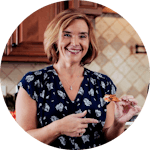Diet Doctor Podcast #32 – Jen Unwin
Att veta vad man ska äta är en sak. Att göra verklighet av det och hålla sig till den nya livsstilen är en helt annan svårighet som involverar vårt psyke och våra känslor lika mycket som blodsocker och insulin. Jen hjälper oss att bli varse utmaningarna och de potentiella lösningar de flesta av oss står inför när vi ger oss ut på jakten efter bättre hälsa.
Lyssna här
Du kan lyssna på avsnittet via YouTube ovan. Vår podcast är också tillgänglig via Apple Podcasts och andra podcasttjänster. Prenumerera gärna och lämna ett omdöme, det hjälper verkligen till att sprida budskapet och fler personer hittar till podcasten.
Tidigare avsnitt hittar du här.
Innehåll
1:20 Välkommen, Jen Unwin!
4:22 Hur ger man patienter hopp?
15:07 Att sätta upp mål
18:30 Utmaningar med en kostomläggning
28:58 Att ge upp kolhydraterna du inte ”kan leva utan”
33:13 Viktplatåer
38:29 Mer om Jen Unwin
Transkription (på engelska)
Dr. Bret Scher: Welcome to the Diet Doctor podcast with Dr. Bret Scher. Today my guest is Jen Unwin. Jen is a clinical health psychologist with the National Health Service in England and also runs a group coaching program with her husband David Unwin where they focus on low-carb nutrition.
Now Jen is an expert at dealing with people with chronic health conditions and helping them have hope and I think that’s one of the big messages of this interview; that she really finds instilling people with the message of hope helps success. And we talk about a lot of the challenges people face, because let’s face it, life doesn’t go on a straight line. Behavior change is hard, nutritional change is hard but it certainly can be done.
And we just have to be able to prepare for what the challenges may be and understand how to overcome them and keep coming back to the message of hope. And I think that’s the big take-home from this interview with Jen Unwin. She doesn’t have products to sell, she doesn’t have websites to visit, but you can see her on Twitter at Jen_Unwin and she just has a wonderful message to spread. So I hope you will enjoy this interview and if you want see the transcripts or see any of our prior podcast episode, you can find us at DietDoctor.com. Enjoy the interview.
Jen Unwin think you so much for joining me on the Diet Doctor podcast today.
Dr. Jen Unwin: You’re welcome.
Bret: Well here we are, at Low Carb Denver and you gave a wonderful talk with your husband. And the teamwork sort of between you two even though you don’t work in the same office, the concept of the teamwork doing the medical side and doing the behavioral side of just behavior change/dietary change.
Give us a little bit of your background and tell us how you got into this working with people with health problems and helping them with their behavior changes?
Jen: Yes, sure. So I’m trained as a clinical psychologist but I specialized in helping people who’ve got long-term health conditions. So that’s something I’ve done in the NHS for the last 32 or 33 years now. And I’ve got a particular interest in the role of hope and trying kind of to enhance people’s hopefulness for the effect that they can have in their own lunch really to improve their well-being and the quality of life even in the face of conditions that they endure.
As we know, these days there are lots of people living for many, many years with chronic pain or diabetes or other disabilities that maybe limit their lives in some way or challenge their quality of life and that for many, many people make daily life a struggle. So I suppose what I’ve dedicated myself to is understanding how to help people to live well and to have some sort of hope and positivity in their lives.
So the way that I’ve kind of tried to think about that is drawing a lot of influence from the positive psychology literature, which I find fascinating which is about the role of things like hope and optimism and being goal-focused and what difference that can make to people and then how to sort of have those conversations with people in a way that’s helpful and empowering.
And I use an approach called solution-focused that comes from– historically kind of began in the States actually as a form of family therapy in a place called Milwaukee and it’s been around for quite some time now. And it’s used in education and social care as a form of therapy, as a kind of conversation which focuses relentlessly on the person and their own personal goals and their own personal strengths and so on to enable them to do that, to move in a direction which is right for them and is more hopeful and positive for them. So that’s kind of quite a long answer.
Bret: It’s a good answer. I like how you talk about hope and positivity because it’s clear that when you have a medical condition that weighs on you every day that you seem like you can’t escape, whether it’s chronic pain, whether it’s depression, whether it’s obesity or trying to manage blood sugars or something and you are not seeing progress hope is really the first to go. And far too often people just throw their hands up in the air. And part of the problem is the message sometimes they are getting from doctors too. Is it your fault? You know, you just need to be better more dedicated, and to have the willpower. So I can see our hope will disappear.
Jen: Yeah, definitely.
Bret: So how do you–? What’s the first interaction like when somebody is sort of in despair and kind of feels like there is no hope? How do you get them to start to see the light? I know there’s probably a lot of answers to that but if you have like a take-home message for people about that?
Jen: Yeah, so my first question when I meet someone, apart from kind of the niceties, is always, ”What are your best hopes for us working together? If you look back in six months-time and you think well, I am so glad I went to that appointment… Because obviously people have lost hope. Not many people want to come and see a psychologist really.
You probably choose to do that, you know, you make yourself vulnerable and you don’t know what the person is going to be like, what they’re going to ask you… So I always say, ”Oh, you’ve come today. ”Obviously you are hoping for something to be different or better. Tell me about that. And that’s always the first really detailed exploration which is around… if they can… I mean sometimes I see even a real struggle for people… that they’ve got so low and hopeless that there is a real struggle to think about what might be different and what might be better because they’ve lost the sense that there is much possibility of that.
Bret: Or they are probably never taking the time to think about what success would look like, because they’ve given up on it. So just asking them the question to visualize what their success would look like and explain it to you is probably a tough job for them.
Jen: Exactly. Now some people take that immediately and can tell you quite clearly so that’s kind of a proportion of people. But others say there are other people who really struggle with, so you have to spend quite a lot of time. And even sometimes the first and even the second appointment might be around the sensitive kind of exploration of what better might look like for them.
And trying to get– I think what you said was really important… was almost like a visualization of what that might look like. And that’s a really powerful thing. Once people start to be able to imagine that in their minds and picture some kind of sense of better or sort of preferred future, that’s when the magic begins really… When somebody can picture that in their minds.
Bret: And also sort of the inner critic that so many of us have, like I am just not good enough, I just can’t do it in, I’m not strong enough, I mean do you have to have people sort of address and attack their inner critic as well?
Jen: Yes, so I think as human beings we are kind of– I always say to people we are sort of prone to notice the negative or the threats in a situation. And that’s why we are here, because our ancestors were really good, you know, looking out for threats or negative stuff. So we’re kind of prone to that and yes as we’ve said, people get very dispirited, people will be very critical and they notice all the things that they can’t do any more, the things that are causing them more pain, they will tend to focus on that. That’s human nature.
So the approach that I take is really through the kind of questions that you are asking people, is directing their attention to other things, shining the light on other things and trying to train them to do that. And you do that through the kind of questions that you ask. So, sensitively asking, when did you have even a slightly less bad day or tell me about a time when just for even a few minutes you weren’t thinking about the pain?
So you have to ask very sensitively because people are suffering and you have to acknowledge that… But tiny glimpses, if you like, I often say, like in a grey sky… are there any times when there’s just the tiniest little bit of blue? Tell me about that. Let’s kind of unpack that. When they had a slightly better day and they tell you about it, what made the difference, what was going on that was different that day and trying to be a real kind of a detective.
Bret: I bet you notice a change in their behavior, maybe even how they are sitting, or their facial expressions… I bet you notice a change when they do that.
Jen: You are absolutely right. You know, people will sit up or they will kind of smile. And also is the practitioner. You are really watching out for those tiny signs yourself. And that’s the other thing, shining the light on that. So I often say to people, I ask them about their slightly better day, I’ll give you an example of a slightly better day…
People often say things like, ”The grandchildren came around ”and you know, that made me laugh because I got distracted by– They were messing about something and that was really nice and…” And I say, ”I notice you smiling… you are smiling when you talk about that. Your eyes light up when you talk about that.” And you can really dig down into that and emphasize it and kind of shine a light on the things that are exceptions to the rule of everyday as suffering 100% of the time. Which is–
Bret: There is a lot of talk nowadays of finding your ”why” or finding your meaning and it’s become almost a sort of a grab-bag term that people just like to throw around, but there’s a reason it’s popular, because connecting to a goal, especially at times of difficulty can be very powerful to help motivate you and a lot of times it is.
The joy of the grandkids or just being able to exercise more, spend time where you can concentrate on your loved ones and not worrying about your own problems. I mean whatever the goal may be, I think connecting with they can be so powerful. So do you help people sort of find that and reconnect? I guess you have little tips you give people of how to reconnect with the goal and how to reconnect with the ”why”.
Jen: Yeah, again you’re absolutely right. If you can understand the person’s values or the things that are important to them and often that comes out in these kinds of conversations. So again using that example I might then reflect to the person, ”It sounds like family is really important to you.” You know, we say tentatively but probably that interaction is telling you when they tell you that their grandchildren have kind of made them have a slightly better day. Yeah, family is really important.
And exploring those kinds of values and as you say goals can also lead into, you know, how can you get more of that in your life, how can you use maybe the reduced energy that you have because people with chronic conditions often have a much less energy to spend during the day and they often feel that they have to spend it on things they should do like their jobs and you know, the kind of things that don’t bring much joy to their lives. So I try to encourage them to notice the times when they are living their values if you like and do more of that.
Bret: Yeah, that’s a good point. They are probably not going to get a lot of this at a general doctor’s appointment that they are seeing for their pain medicines or for their diabetes medicines. The system just isn’t built for that here in United States and I assume in England as well.
Jen: Yeah.
Bret: So it really takes someone like you, someone with that expertise, with the time, with the caring and the knowledge to kind of bring it out of them. Is that the case?
Jen: Well, I would say kind of yes and no. So maybe somebody with that specialist skill and training might be the right person for somebody if they’ve got very, very low and depressed and hopeless, maybe that’s the right thing to do. But I also think as you saw as we did in the kind of demonstration that you can incorporate these ideas into very brief encounters even in a hospital where you’re making somebody’s bed, you can incorporate some of these ideas and questions into those very brief encounters if you have that kind of mindset yourself where you are asking people those sorts of questions.
I think you can and David does it in his 10 minute appointments. I think if you’ve got extended contact with someone– yeah, maybe it’s only 10 minutes but that may be every week or you know, in a hospital setting every day… you can then build up quite a good rapport with somebody.
Bret: I guess that’s a great point. You can think of it as like an hour appointment of sitting down and going through all the different things that your feeling and your goals and your challenges, or if you only have a 10-minute appointment simply asking, ”Tell me something good that happened, tell me a victory you had or a time you felt great.” Just that one question – it could take 30 seconds or a minute, but just that one question can make a big difference, right?
Jen: Yeah. Or tell me about, you know, the proudest achievement in your life or anything like that that’s going to improve somebody’s sense of confidence about their own abilities which they’ve often lost, haven’t they? Exploring how people got through difficult times. You know, they may be telling you about a very difficult experience. You know, a question like, ”How did you get through that? ”How did you do that? Did any good come out of that and all?” Those kinds of questions.
Bret: Right, reminding them that they’ve overcome challenges before. They’ve done it before and they can do it again. And so you mentioned before about setting goals, because achieving goals can be a very powerful positive influence. And we talk about long-term goals and short-term goals. So how do you help people kind of framework their goal-setting to have that positive feedback? And not sort of get bogged down in the, ”I haven’t lost my £50, my pain isn’t completely gone yet”, and thinking about the negative, but rather turn them to the positives of goal success.
Jen: So we talked about in the first appointment or the first conversation with somebody establishing what better would look like and then I usually get into a sense of scaling that.
So I present it as, we’ve talked about that your best hopes would be around– you know, maybe that our maybe having more energy to play with the grandchildren, maybe have a goal of taking them on holiday or something, whatever it is for that individual… if that was your 10 out of 10, that absolutely would be brilliant for you and not to have 10 where actually absolutely none of that thing exists or it feels completely impossible… where are you now? And nine times out of 10 people don’t say zero actually.
Nine times out of 10 people would say, ”I did spend an hour with the grandchildren. ”I was able to play a game of snap with them or something and you know, maybe I am a two or a three.” And that again already gives people a sense of progress. They’re not at zero. That’s a different case. If they say zero you kind of go down a different road. But two or three, okay, that’s really interesting. Maybe if you were a three and a half. Tell me about that. What would that look like? They say, I don’t know, I’d take them to the park.
They will come up with something themselves. The fact that they’ve come up with it themselves means it’s kind of doable because they’ve generated it themselves you already know that they’re contemplating that they could actually do that. So you have to say to the person, ”Go and do that” or ”What is the next step?” It’s not about the means if you like, it’s just asking, ”What would that look like?” And nine times out of 10 they do usually go away and do that thing. Not always, but quite often.
And because you’ve not said to go and do it if they come back and they haven’t done it is not a failure. So you’re never setting someone up for failure because if they come back and they have done it that’s fine, but they might say, ”I didn’t do that but we did– People go away and have complicated lives, so I think the trouble with setting specific goals is that sometimes people can’t achieve them.
Bret: Yeah, I like the idea of having them come up with the idea, framing it in a positive way and that gives them the idea to go out and do that. I think that is a good approach.
Jen: And then when you see them the next time you can say, ”What’s gone well since we last met?” So what’s better?
And people start with something negative actually but usually will come up with something that has been better or they may have done the thing that they said that they were noticing. And you can say, ”10 out of 10 is where you’ve been. ”Last time we met you were at two and a half. ”What would you give yourself today and why? And what else is going well? What else have you noticed?”
Bret: Now one of the big interventions that we talk a lot about with lifestyle change is nutrition. There is a whole lot to lifestyle change but nutrition is a big part of it and in this community specifically the low carb lifestyle which we’ve seen have so many potential benefits. But is not always so easy for people, is it?
I mean in the keto community, in the low-carb community, you hear a lot about success, you hear a lot about people doing wonderfully, but there’s a pretty large subset that struggles for different reasons. So tell us what you think some of the biggest struggles you’ve heard are? And then we can maybe talk about some strategies to get past that. But what are some of the biggest struggles people have or the reasons why they’re not succeeding the way they want?
Jen: So in the group that we run together, David and myself at his practice and the conversations that we’ve had there, I think we’re coming to think that the biggest struggle is the addictive nature of sugar and carbohydrate. And I think that’s a really big topic and that people can often do really well in the beginning and they get it and they have great success and then for whatever reason they slip up and then the struggle is to sort of get back on track.
So I would say that’s probably the biggest reason for the struggle or for setbacks and then we try and never frame that as a failure, but just as like, ”Okay, interesting”… What were the kind of circumstances of coming off track? If they want to get back on track… ”You might handle that differently next time… would you have a different plan? How are you going to get back on track? ”
Bret: And I’m sure some of the most common reason for people slipping up can frequently be increased stress, a job change or a death in the family, or someone is sick, or some sort of an internal stressor where then you turn to that addiction of food and carbs and sugar for comfort.
Jen: Absolutely and I think people have to forgive themselves for that. I think there is another whole layout and people are very self-critical about that and that’s certainly going to add to the stress. It’s easier said than done, but acknowledging that most people are going to fall off the wagon at some point and sometimes big things are going on in life and you have to prioritize– and sometimes that’s the priority.
Bret: And I think that’s a good point. When I work with people I want a layout from the beginning; ”Look, you’re not going to be perfect. Nobody’s perfect, there are going to be setbacks.” So getting in their minds, like you said, it’s not a failure when it happens. It’s almost sort of an expected occurrence but to learn from it. So I like what you said, ”How would you do it differently next time?” Not, why did you do that? Why did that happen?
Jen: And also reminding people, ”How did you feel ”when you were really kind of in the zone ”or when you were really happy with how your kind of nutrition was going? What did you notice about yourself?” And they go like, ”I was energetic, I was sleeping well, felt good.” So again reminding people of when they’ve been at their best and try to get back to that. How did you do it last time? How did you do it in the first place? How did you get in that good place for you?
Bret: And to prepare for the same thing to happen again, because if something happens once chances are it’s going to happen again. And how would it be different? So even like a really bad night sleep. I think we’ve all had that and carb craving the next day and–
Jen: And there’s evidence for that, that it really does make people eat more the following day.
Bret: Right, the leptin, ghrelin, the hormones of, ”I’m full”, or ”I’m hungry” are all thrown off.
Jen: And that kind of help people, and you can say that the science will tell you that that that’s going to happen.
Bret: Well, it’s not your fault, it’s the science. It’s your body hormones.
Jen: It’s your physiology, that’s a really big thing I think about the whole– the self-blame thing about the addiction. I think it’s really– it does really help people to label it for some people to label it as an addiction so that they can say, ”This stuff is affecting my brain.” I often say to people is, how do we learn to ride a bike? We fall off a lot, don’t we? You learn to balance by falling one side and then falling the other side. Learning a new skill is about wobbling.
Bret: Right, great analogy.
Jen: I think David showed that graph where the guy learned three times and the third time did much better and each time the oscillations were slightly less. So you know yet people may fall off spectacular style, but I think if they can remember how well they felt when they were doing it and how they did it the first time then get back on again and–
Bret: One of the other interesting things is just the environment that you are in. So it can be relatively easy to control your home environment or it can be relatively difficult if you have kids and a significant other who maybe aren’t on the same program as you. What kind of advice can you give people to help with the home environment to make it as risk-free as possible and–?
Jen: That’s a really good point.
Bret: –as tempting-free as possible.
Jen: The environment is a really big one, isn’t it? Because we know that willpower is ”exhaustible”, isn’t it? So you get home at the end of the day, if you had a long day at work, and all your intentions are to go to cook yourself this healthy dinner and then sitting on the counter a packet of crisps or something someone else left there. It’s so difficult you know when you’re tired to kind of stick to the stuff.
So I always say to people it’s about building those good habits and engineering the environment, yeah. So if you can, put stuff out of sight. So if other people in the house want to have it, can you have your own cupboard and only go in that cupboard? Can you have your own shelf on the fridge so that you are kind of training yourself to have those new habits really.
So if you tend to overeat certain things even if they might be the kinds of things that you are allowed to eat, like we often overeat nuts or cheese, and maybe don’t want to… Because quite a lot of good food is about packaging things up in smaller packets, so even if you buy things in bulk then transfer them into smaller pots.
Bret: Right.
Jen: Nuts, you can put them in the little click boxes in portions because it sounds like such a tiny thing but actually psychologically you will eat less if you are doing that than if you’ve just got the giant packet. They’ve done quite a few studies on that with popcorn mostly, but you know that people, if they have a giant bucket, they eat much more.
Bret: Oh goodness… salted macadamia nuts, if there’s a big bag of them, I’m in trouble.
Jen: We all have things that actually we can’t moderate. And that is the other thing I say to people like, you know, that’s unique to you. So if that’s the thing that you can’t moderate, well you’ve got a choice there of maybe not buying it. Yeah, we are on the same… peanut butter, I can’t moderate it, so we just don’t buy it, we don’t have it in the house. Have other things.
So engineering the environment, thinking about preparation, taking things to work rather than being tempted to go to the canteen if there’s– Some canteens obviously you’re going to find would have good options, but some places I guess is not going to be much that you want to eat.
Bret: Work is a whole another environment because there you have a lot less control. At home you can tell your family, you can set things up, you’re going to somewhat control over people but at work, you may have to give up all control and there is going to be candy jars and there’s going to be cake in the break room and there’s going to be chips everywhere.
Jen: Cake pushes yeah. There’s nearly always some cupcake baking person in the office who is bringing things in. And I think that’s another challenge. We often talk about how you might– you can even maybe do some role-plays to practice how you might politely turn down cake. I think people socially feel quite awkward saying no to someone who’s made them, you know, a special cupcake or something, the kind of taking it out of politeness.
And so trying to think how you can have those conversations with people in a way that you feel comfortable with. And do you want to put that politeness above your own health? Yeah, all of these things are challenges. I think all of us are still on a learning journey. We’ve been doing this for six or seven years ourselves and I think it’s still a challenge.
Bret: I like the idea of role-play because it could be in your whole life you’ve never said no to somebody offering you a sweet or offering you a treat. So when it happens you could be very uncomfortable to do that. So having had the experience beforehand in sort of a safe environment where we you can practice that I think that’s a great idea.
Jen: And you can come up with little phases like so… if people offer me a sweet from a bag, I say I’m trying to give them up or something like that. And when they say, ”Oh, don’t you like cake?” I say, ”I love cake, but it doesn’t love me.” So I think you can do it in a humorous way or you can just be upfront with people and say, you know, you’re really trying hard for health reasons or trying to lose weight and I think people are sympathetic with that, aren’t they?
Bret: Sometimes I recommend people actually have like a signed contract that they have their family signed, or maybe a coworker sign it, sometimes people think it’s a little cheesy and over-the-top but it can be really helpful because then people understand we are coming from ahead of time and then hopefully they will stop offering you the cake because they know what goals are and what you’re trying to accomplish.
Jen: I think that’s a really good idea. Or even to have a conversation and say, you know, I’m really trying to achieve this for myself. It’s really important for me. Help me by, you know, don’t offer me that stuff. Asking for people’s help I think people are– On the whole we all want people to be happy and support our colleagues.
Bret: Right. And what about people who just have the psychological barrier to, ”I just love bread. I just love pasta I just can give it up.” But yet they have had some success with low-carb, but they keep falling back because it’s just kind of a core of who they think they are. How do you help them get over that?
Jen: It’s difficult, it’s really difficult. I think going back to, you know, what their ultimate goals are. So it’s having that kind of motivation for a sort of future goal where maybe we can get over that hump of trying to give something up. I think explaining about addiction, I think that that’s important. The other thing is about what else have they got in their lives that they love that isn’t food related. So that is always a conversation I have with people.
Because if there’s a food addiction issue we know that that hijacks the dopamine pathways and other neurotransmitters. And dopamine really strongly links with motivation, but what it does is it makes you just motivated for that one thing, you are getting all your reward from food. So let’s name that and let’s think where else you might get rewards or kind of pleasurable brain experiences. So what hobbies or, you know– physical activity is actually a big one.
Not necessarily for weight loss but to enhance people’s mental health and I think that has a really powerful effect if you just get people even walking. We know, all the science is there, for mental health and exercise. And to get those kind of good endorphins going. What hobbies have they maybe given up either due to their size or pain or whatever? But what kind of things might they enjoy, social connectedness, you know, all of those things are other ways of getting that good feeling.
Bret: Right, if you’re taking something away that they’re used to getting that dopamine rush or that good feeling, you can’t just take it away and expect success without replacing it with something else, hopefully something healthier.
Jen: Yeah, building up and again moving towards that kind of life that they want.
Bret: Are there other struggles you see people go through, other sort of common themes that come up that you address with people?
Jen: The kind of struggles and the kind of perennial questions we get in the group would be exactly as you say, like at work what do I take if I’m travelling? How do I deal with that? And it’s all about planning… Yeah, the addiction side of things, falling off the wagon. What else does the group talk about? I guess those are probably the big ones I would say.
Bret: And then as you see in progress, as you see them have hope, I mean I assume you just see a tremendous amount of success.
Jen: Yeah and the group is lovely. And the other thing is celebrating success obviously as you go along. So you saw the photo of the lady with the jeans so we often encourage people who’ve had either noticed something about their health, their well-being or they’ve reached their goal. We encourage them to share that because it inspires other people.
There is nothing so inspirational than seeing someone else who you identify with who lives in your community who might be the same age as you, you know, doing amazingly. And quite a few people in the group have been doing it for five or six years now, so one or two people are still losing weight after all that time or who have lost really a significant amount, six or seven stone, and they are occasionally bringing their photos to show the new people who always are obviously blown away.
Bret: And for that person to be the example, to be the shining example of success, that must just lift them up.
Jen: So hopeful for the people coming in but so fantastic for them as well, because then that becomes part of their kind of own view of themselves, as a success, as an inspiration to other people, you know, they can see how far they’ve come.
Bret: I know there can be a lot of goals but weight loss frequently is one of the big goals. And weight loss rarely goes in a straight line. There are ups and downs and ebbs and flows. So let’s talk about stalls; people like to talk about stalls. ”I was doing great and then I stalled on my weight loss, I started to gain a few pounds.” What goes through your brain as sort of a checklist to help this person figure out why they stalled and how they get past their stall?
Jen: That’s right and usually it’s about thinking about… have things been creepy? Like we were saying about the nuts and the cheese and those kinds of things, have they actually been drifted–? Carb drift is another thing, isn’t it? The little things that are creeping in like maybe the old biscuits at work, that kind of thing. The other thing I think that David often brings in is the time restricted eating idea.
People really get that because it explains a lot about physiology to the patients and the idea of trying to keep insulin low and not needing to eat breakfast and there’s all the evidence now for the kind of window eating. So I think that can be a kind of a second phase for people who want to get used to the idea of the whole nutrition side, then they can start reducing the window. But also David always is really against snacking because again that can creep up. So I think if you can base your daily routine around meals and not kind of an endless grazing… again there’s evidence of that because of the insulin side.
Bret: And snacking frequently is more of a psychological issue than our biological hunger issue. Jen: Feeling a bit where, you know, you kind of fancy a treat… We have all been kind of trained into the snacking thing. Sometimes it still blows my mind how far this is from the sort of conventional wisdom that we all grow up with, which is, you know, eat little and often, eat low-fat.
Bret: I’m sure that takes quite a bit of education too just for people to understand that what they’ve heard and what they’ve been taught for decades actually isn’t necessarily the right path to success.
Jen: And there’s an emotional response to that I think. I had one myself which was– I can’t believe all those decades of kind of struggling to do that and– There was this speaker yesterday who said about blaming themselves for not being successful in that whilst being successful in other areas of your life, you know, and having like a whole area that was a struggle the whole time.
Well, you know, when you find out you didn’t really need to struggle, there was a response to that and having had family members who definitely would have benefited from this. I know for sure that my mother would have been so much more well because we have basically the same sort of physiology. Kind of, you, there is an emotional response to that and people have that as well in the group.
Bret: So how many people do you work with at once in your group?
Jen: The numbers are kind of creeping up over the years because we never say people can’t come back. And they often bring– what we like is for people to bring a family member if they wish to. So maybe the person is just the shopping and the cooking and we often find that they obviously are losing weight as well as other members of family, neighbors and so on.
So some people often brings with them so we definitely need a bigger room. The standing room only is– some of the groups we’ve had were, you know, 20 to 30 people. Started off as only a few. But we are still getting a good interaction as well and people are sharing success, asking questions, sharing recipes. I’ve got a little Facebook group for them as well.
Bret: I’m sure that shows the power of community, the belonging to the group, having other people to share the experience, share the struggle, share the successes. I mean I’m sure that goes a long way for lifting hope like you were saying.
Jen: Yeah, definitely and, you know, the fact that people are still engaged after six years is a great sign that they are finding it helpful. I think the long-term support is important, you know, either through online communities like Diet Doctor or through finding a local group or just doing it with someone else. I think that that does really help.
Bret: Right, it’s not like just a six-month thing and then all the challenges go away. It doesn’t work that way; the challenges continue for years but–
Jen: Once a sugar addict, always a sugar addict. You know, it’s only like the same struggles people have with drug and alcohol. Those are lifelong struggles, but there are ways to keep on the bicycle.
Bret: Right and it’s great to see the long-term success so I’m sure you must feel very, very full and very joyful to see all the success that you’re helping people to have.
Jen: It’s really uplifting to see the differences. I’m sure you feel the same, you know, to see the difference it makes in people’s life. Someone who has been extremely overweight and taking lots of medication and feeling unwell to then see them, you know, jogging around town and really enjoying their life. Yeah, that’s special.
Bret: That’s wonderful. Thank you for joining me today, I love the message of hope and the message of success and how we can put that out to people to show them that yes, this can be done and yes, you can do and here is how. It’s a wonderful message.
Jen: Thank you.
Bret: If people want to learn more about you where can you direct them to hear more about your thoughts and what you’re working on?
Jen: I guess the other videos… There’s a bit of stuff on diabetes.co.uk as well.
Bret: Thank you again for joining me; it’s been a great conversation.
Jen: Thank you, I enjoyed it.
Om podcasten
Inspelad vid konferensen Low Carb Denver i mars 2019, publicerad i november 2019.
Värd: Dr Bret Scher.
Ljud: Dr Bret Scher.
Klippning: Harianas Dewang
Tipsa andra
Gillar du Diet Doctor Podcast? Hjälp gärna andra att hitta den genom att lämna ett omdöme på iTunes.







